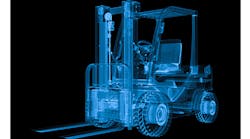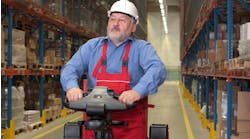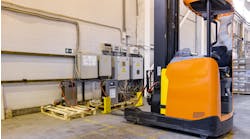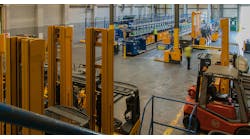As businesses continue to focus on achieving more with less, companies have been finding ways to increase productivity and reduce their carbon footprint. Implementing energy-efficient efforts throughout facilities and choosing energy-efficient equipment positively impacts both bottom-line savings and the environment.
From new technology to advances in energy-efficient lift truck equipment, consider these tips to further enhance your operation’s productivity and efficiency.
Selecting the Correct Equipment
Identifying the right type of forklift to use for your unique operation is essential and can have a large impact on productivity. The type of order picker, reach trucks, walkies, or other lift trucks used can either improve or hinder an operation’s efficiency, accuracy and overall performance.
Forklift semi-automation allows businesses to rethink their business’ existing operations—processes once handled by an operator can now be performed by a forklift:
● On-board navigation systems can help lift trucks determine the best path for travel and lifting, which can drastically reduce the time spent in order picking or put away.
● Semi-automation lift truck technology can also help optimize order picking and stacking accuracy and reduce fleet and labor. Some turret trucks and order pickers utilize warehouse navigation technology with RFID for a semi-automated approach to operating within warehouse aisles. Transponders embedded in the floor precisely identify aisle locations and continuously measure distances. Since semi-automation technology can help eliminate human error and save time, applications can see up to a 25% increase in productivity in addition to improved flexibility with logistics performance.
There are many different types of forklifts that offer technologies to further generate improvements in productivity. Selecting the appropriate one allows your operation to do more in less time while reducing fleet size and addressing storage space concerns.
Leveraging Energy-Efficient Equipment
The global trend toward use of electric products is quickly changing the way businesses operate. It’s important to take a moment and start thinking how this electric trend brings value and helps your operation’s complete tasks in a safe, fast and effective way.
Energy-efficient forklifts enable more work production, while using less energy along with operational efficiencies, such as:
Reduced downtime for battery charging. The internal design of some forklifts use 5th-generation alternating current (AC) technology for increased energy efficiencies. This allows the forklift to consume less energy, leading to extended battery life and increased run times—with many able to run up to two shifts on one battery charge with no battery changing necessary between two shifts.
More work productivity in less time. The lift truck’s energy efficiency also translates into productivity and time savings. The more efficiently a lift truck runs, the longer the operator can work without having to stop and recharge or change the battery.
Save money and reduce energy cost. A forklift’s runtime also directly impacts operating costs. Some lift trucks are designed to retain high levels of energy efficiency and reduce energy consumption through the use of highly-efficient motors and optimized controllers. Depending on the fleet size, the costs associated with watering, battery cleaning and additional battery charging stations can be eliminated, reducing battery-charging costs by up to 50%. The ability to run for two shifts on one battery charge also eliminates the need for an extra battery, saving customers thousands of dollars on battery costs per truck. This can translate into even higher savings for larger fleets.
Utilizing these tips will significantly help reduce costs, improve productivity and drive larger overall performance within your warehouse. Looking ahead, advances in lift truck technology and design will continue to bring new benefits to users, including new ways to reduce costs, improve accuracy and streamline operations and processes while reshaping the way materials and goods are moved in the future.
Perry Ardito is general manager, Warehouse Products Group, with Mitsubishi Caterpillar Forklift America Inc. (MCFA), a manufacturer of forklifts.



